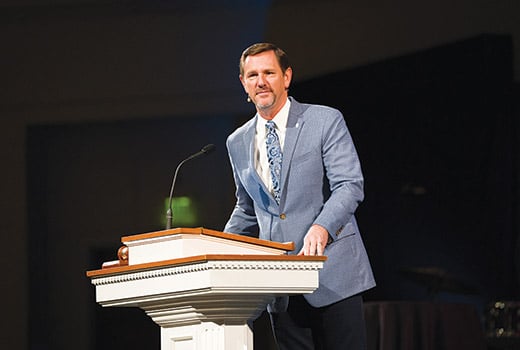The digital numbers on the video screen counted upward in half-second intervals like an out-of-control speedometer: 2000, 2001, 2002, 2003, as IMB President Paul Chitwood preached from Revelation 20 before messengers of the 203rd annual South Carolina Baptist Convention Monday night at Shandon Baptist Church in Columbia.
When the 28-minute sermon concluded, the counter abruptly froze a little north of 3,300.
There was nothing distinct or ominous about the number itself other than its meaning: It tallied the number of people who died without saving faith in Jesus Christ during the sermon. Multiply that out to a 24-hour day, and Chitwood said 157,690 people die lost every day, every one of them irrevocably facing eternity under God’s wrath in hell.
That being the case, the world’s greatest problem is not war in Ukraine or the Middle East, world hunger, human slavery and displacement; it’s not climate change, crime or poverty; the world’s greatest problem is lostness and the wrath of God all those outside of Christ must face.
“There’s no greater problem,” Chitwood said. “Every other problem will end the day you die. There’s no addiction in the grave, no family conflict in the grave, no war in the grave — all your problems end but that one. And the magnitude of the problem sets in the minute you die.”
Pointing to the final verses of Revelation 20, which speak of humanity’s final judgment before the throne of a holy God, Chitwood pointed out the two most drastic issues that lostness brings about.
“It’s an eternal problem and it’s a universal problem,” he said, “and that number is getting larger as I preach this sermon.”
Preachers and pastors who neglect to preach the Bible’s clear warnings about hell and those who opt to believe annihilationism — a notion arguing the wicked will be exterminated and cease to exist after death — are leaving the lost in a dangerous position, he said. But those who believe in hell but are not compelled to proclaim the good news of Christ to the lost with urgency are living as if hell isn’t real, he said.
“Regardless of what annihilationists choose to believe, the Bible teaches that hell is forever,” he said. “To diminish the eternal consequences of hell is another way of diminishing the reality of hell.
“Brothers and sisters here in South Carolina tonight, I’m here to tell you that the greater danger is not that we don’t believe hell exists, but the grave danger is that we would conduct our lives and relationships as if hell does not exist.
“That should not be lost on us. That should not be lost in our preaching. That should not be lost in our teaching. That should not be lost in our daily lives. That should not be lost in our beliefs or in our convictions. Wars don’t last, but hell does. … Every problem a person has ends when they die, unless they die lost. Do you believe that?”
God has solved the problem by sending His Son to be the Savior of sinners, Chitwood reminded hearers. We must have confidence in that gospel and its power to save sinners, and that confidence should motivate us to go and tell the world, he said.
“South Carolina Baptist churches exist to slow that number down,” he said, “because hell is real and so is that number. But just as real is heaven, and a God who so loved the world that He gave His only begotten Son to solve the world’s greatest problem.”

